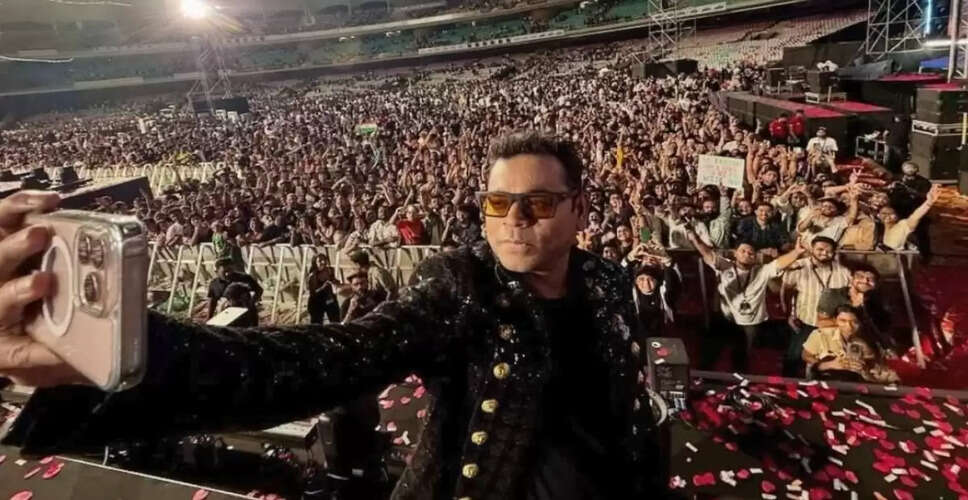AR Rahman Reflects on the Impact of Bombay Dreams on His Career

The Significance of Bombay Dreams
How crucial is Andrew Lloyd Webber’s Bombay Dreams for your career?
It was unexpected. I always envisioned myself composing for films and perhaps creating non-film albums, but never a theatrical production. My understanding of the significance of musicals deepened only after I attended a few performances post my signing for Bombay Dreams. It became clear to me that there was a vast potential for creativity in this field. Working on Bombay Dreams has been incredibly fulfilling. While critics have not always praised the play, they have appreciated the music. The initial criticism has subsided, and I believe Bombay Dreams possesses its own unique charm. Farha Khan's contributions have been invaluable. Nowadays, when I converse with Andrew, he often reminds me that I have established a presence in London.
Considering Future Opportunities
Are you contemplating that possibility?
It’s a bit perplexing at the moment. There are countless opportunities available there, but my roots are firmly planted in Chennai. I trust that life will unfold as it should. I don’t feel pressured to make decisions hastily. Initially, when Bombay Dreams was in its early stages, I was only tasked with creating two pieces. After Andrew Webber listened to some of my work, he outlined his vision, leading to the development of an entirely new score. Collaborating with Shekhar Kapur and Webber, we crafted a storyline, and then Meera Sayal took over to write the script. There was a period of stagnation lasting about 6-8 months, during which I feared that Bombay Dreams might remain just a dream, until it suddenly gained momentum again.
Response to the Musical
Are you satisfied with the reception of the staged musical?
Bombay Dreams has made a significant impact in England. Whenever I arrive in London, many Asians approach me, saying, “Before Bombay Dreams, we felt overlooked. Now we feel recognized.” I’m not entirely sure what they mean.
They mean Indian popular music has regained respect in the West.
Oh, that’s encouraging (laughs). The entire music industry is currently facing challenges. While my music is selling, the overall market is struggling, making it difficult to thrive. However, there are many developments in the West, including soundtrack offers from Hollywood. It’s a challenging decision to make. I can’t abandon everything here. A decade ago, it was my dream to study music and work internationally. It’s exhilarating to see my work appreciated abroad, but the contributions I’ve made at home over the past ten years have garnered me this Western attention. I can’t forsake my roots, yet I feel the need to progress.
Western Offers and Future Collaborations
What kind of offers do you have from the West?
There are several, including a crossover film for Columbia Pictures. I received two film offers from prominent Hollywood directors, but they didn’t excite me. Additionally, I have an opportunity to create a philharmonic album. I’m exploring various ideas. However, I acknowledge that popular film music in India seems to have reached a standstill. This often occurs when artists play it safe. Art is limitless, akin to a boundless ocean. Even a slight change can create a significant impact.
What do you think is hindering popular Indian music?
If the melodies are enduring and the lyrics are meaningful, people will respond, even if it takes time. Watching children effortlessly sing challenging songs on television’s talent show Sa Re Ga Ma makes me realize that the most memorable songs resonate with life experiences. Composers often take the easy route, crafting tunes that may top the charts briefly but are soon forgotten. I ponder why an album like The Legend Of Bhagat Singh didn’t succeed despite my hard work. I had to create new melodies for established classics like Mera rang de basanti chola. Unfortunately, if a film fails, everything, including the music, suffers. I believe the theme of terrorism overshadowed the overt patriotism in Bhagat Singh’s narrative, which may have deterred audiences.
Future Collaborations with Andrew Lloyd Webber
Are you planning to collaborate further with Andrew Lloyd Webber?
He has expressed interest in creating an opera with me, although I’m unsure of his vision. I will find out soon. Additionally, Shekhar Kapur is interested in developing a film titled Paani, set in a futuristic Mumbai. We’ll see if that materializes. Shekhar has begun working on the script with the writer from the Jim Carrey film The Truman Show.
